Which Files Contains All Services Started At Boot Ubuntu
System services are the processes or system programs known as 'daemons' that continuously run in the background. These services wait for customer requests and are responsible for how the arrangement works and how it communicates with other programs. When working in a Linux surroundings, including Ubuntu, you lot can easily manage all system services (offset, end, restart, enable at system boot, etc.) through a service manager. Most of the modern Linux distributions, such as Ubuntu, now use a process managing director known every bit 'systemd'. The systemd is a service managing director in the Ubuntu system and used to replace the 'init' process. The systemd services manager is controlled by the primary command-line tool 'systemctl' control.
We volition show you lot the diverse techniques in this tutorial related to list or viewing all services in the Ubuntu xx.04 system.
How to list all services in Ubuntu?
Various services are running in the background of your Ubuntu Linux distribution. While working equally a organization ambassador, you must know how to view all services, including system services such equally (login, process management, syslog, cron jobs). You must have the knowledge to view all network services (remote login, web hosting, file transfer, DNS and DHCP, etc.) using the systemctl control and other ways you lot can control or manage all Linux services. Nosotros will also discuss this in this article.
List all services using the systemctl command
When the systemctl control is used without any arguments, in this case, information technology displays the list of loaded systemd units, including services either these are active or not.
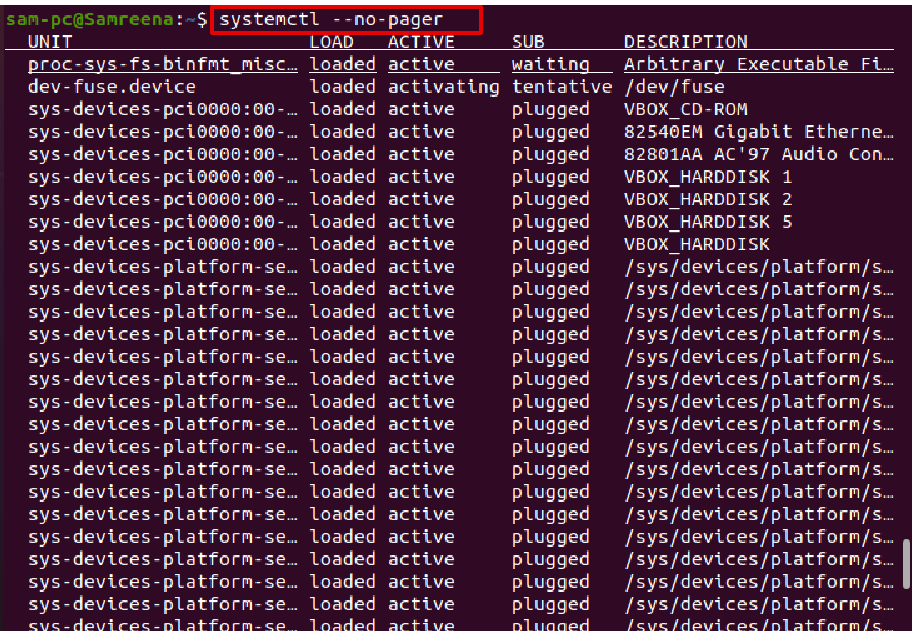
The following command will too brandish all services unit of measurement files:
$ systemctl list-units --all --type=service --no-pager
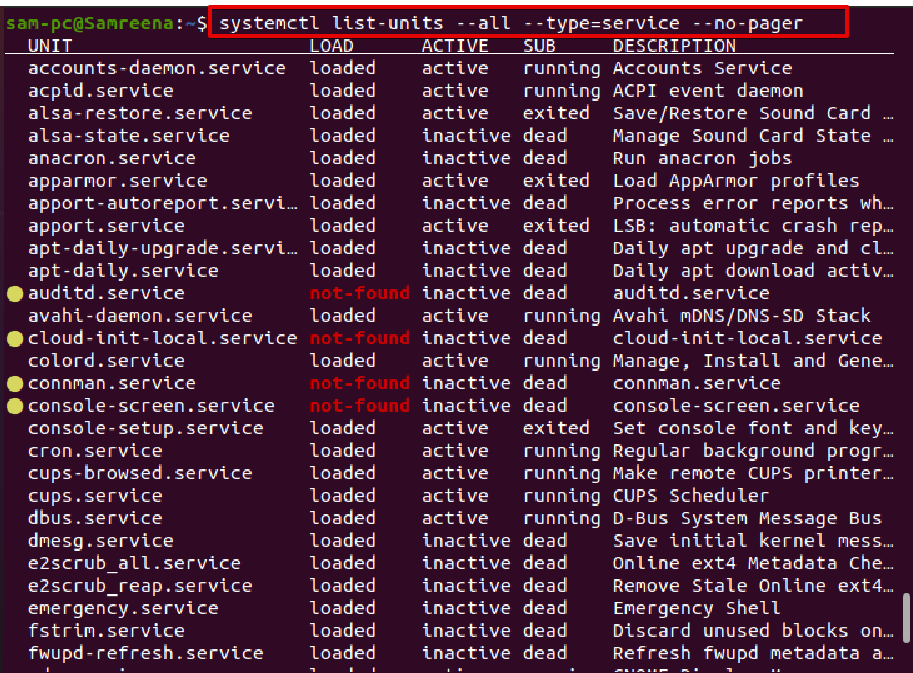
In the output, the details about Unit, LOAD, ACTIVE, SUB, and service Description displays in the class of columns every bit follows:
- Unit This column shows the corresponding details about the systemd unit name.
- LOAD The cavalcade displays the information nigh the unit, either currently loaded in the memory or not.
- Active This column shows whether the systemd unit is active or not.
- SUB This cavalcade shows the running state of the systemd unit.
- DESCRIPTION This cavalcade displays the short details almost the unit.

How to list systemd unit files?
The beneath-mentioned will evidence the all available systemd unit files rather than their type and running status info:
$ systemctl listing-unit of measurement-files --no-pager
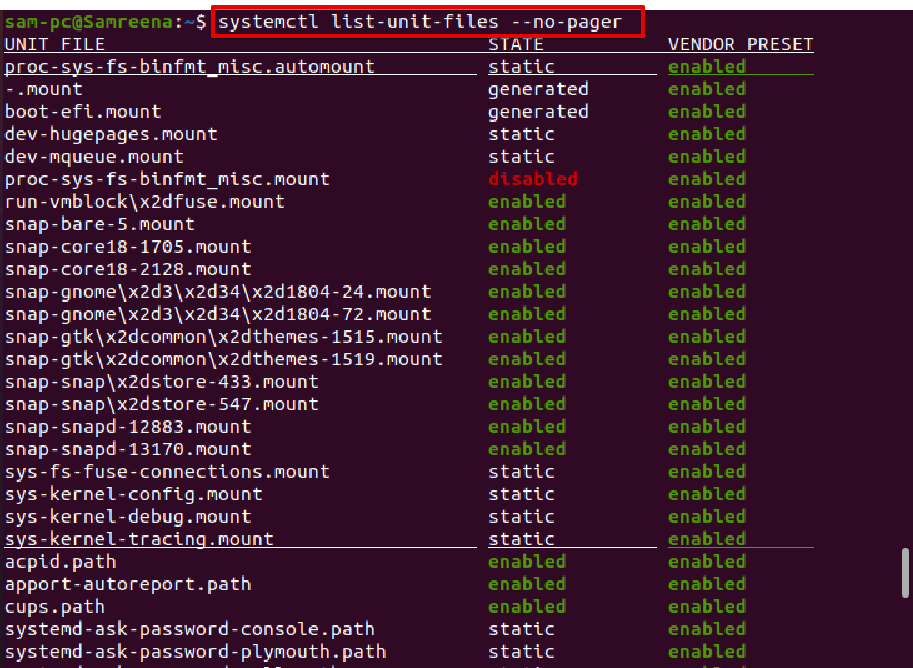
Use the grep control in instance yous are searching for a specific unit file. For example, the below command will search for an apache2 unit file:
If you want to search for a specific unit file, you can also perform this action using the grep control.
$ systemctl list-unit-files --no-pager | grep service-name
For case, nosotros desire to search an apache2 service unit file by using the grep control as follows:
$ systemctl list-unit-files --no-pager | grep apache2
The higher up command will retrieve all unit files related to the apache2 service that you can encounter in the following screenshot:

How to list systemd service unit files using states?
The post-obit systemctl command will testify you the data about all enabled systemd unit files on Ubuntu twenty.04 system:
$ systemctl list-unit of measurement-files | grep enabled
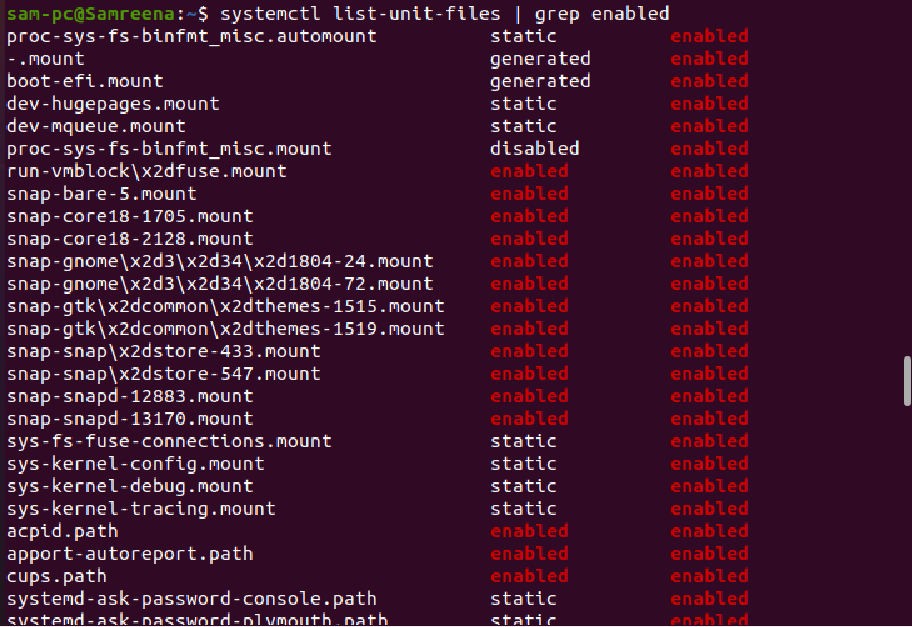
To display all disabled systemd unit files, run the beneath-mentioned command:
$ systemctl listing-unit-files | grep disabled
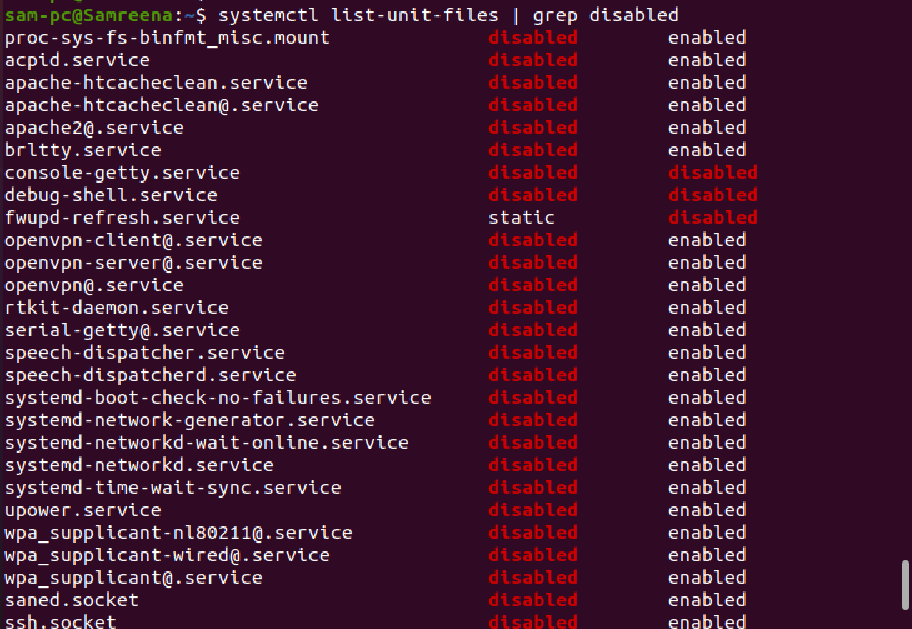
The services that are enabled on your system automatically start on organization reboot.
List all active or running services
Using the 'systemctl' command, yous can filter active or running services from the all services list every bit follows:
$ systemctl list-units --all --type=service --no-pager | grep running
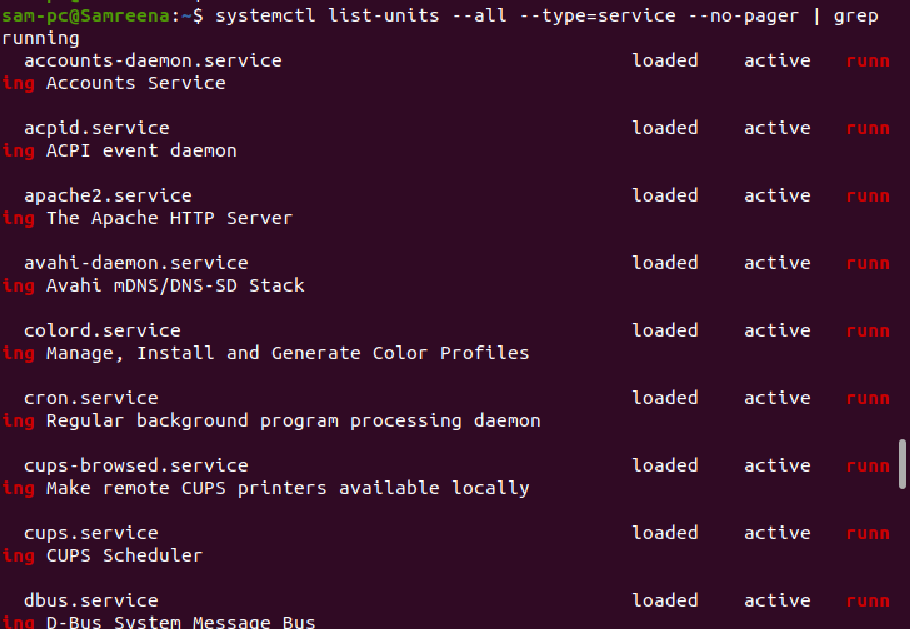
Or
$ systemctl --blazon=service --state=running
List all excited services
By running the below-given control, you lot tin can easily list all services with the excited land:
$ systemctl list-units --all --type=service --no-pager | grep exited

List all stopped or dead services
With the assistance of the following control, you lot can easily list all disabled services on the final window:
$ systemctl list-units --all --type=service --no-pager | grep dead
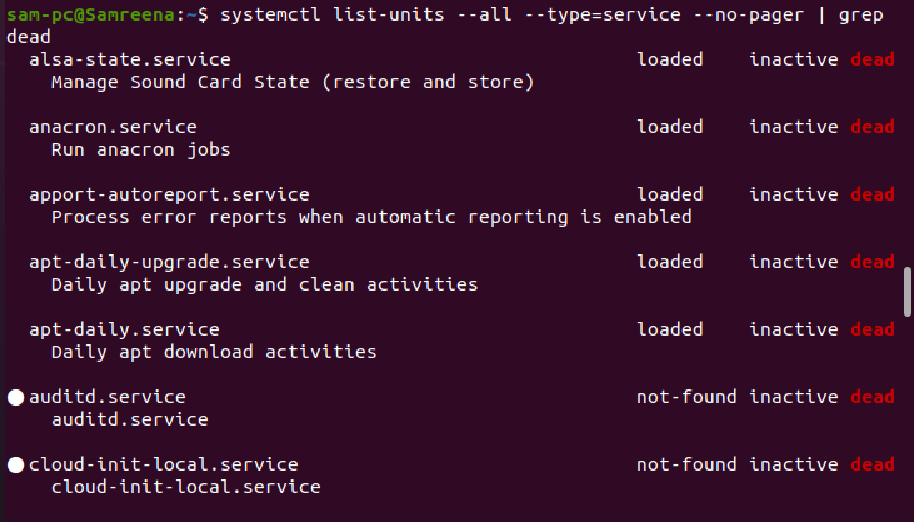
Managing systemd services using systemctl
The systemctl is the most commonly used command to manage the systemd unit files and services in Ubuntu 20.04 distribution. Users can enable, disable, start and cease services using the following commands respectively.
$ sudo systemctl enable service-name
$ sudo systemctl disable service_name
$ sudo systemctl commencement service_name
$ sudo systemctl disable service-name
Using the above commands, you tin control each service land based on your requirements.
View service status using systemctl control
To view the detailed information about a particular service, use the below-mentioned command:
$ sudo systemctl status service-proper name
For example, we want to bank check the complete condition of the 'ssh' service. In this case, past running the following command, y'all tin display the consummate status of the ssh service every bit follows:
$ sudo systemctl condition ssh

More commands to list services in Ubuntu
Employ of pstree command
Using the 'pstree' command, y'all can listing all running Ubuntu services in the course of the tree structure equally follows:
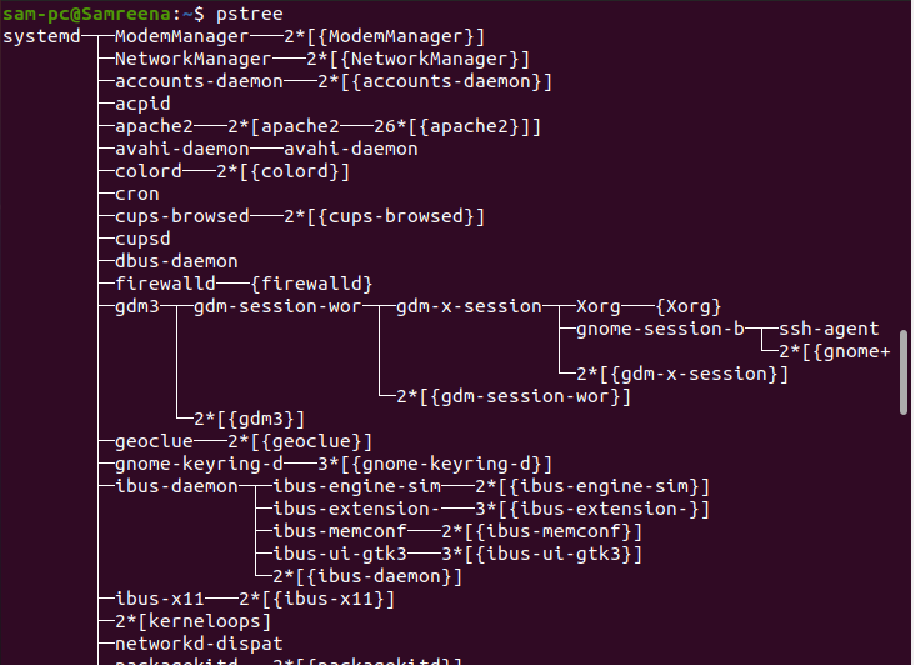
List firewall services
Past running the following command, the user can hands listing firewall services and ports:
$ sudo firewall-cmd --listing-services

$ sudo firewall-cmd --listing-ports
List top control groups with resource utilization
The 'systemd-cgtop' command is used to display the top control groups by their resource utilization as follows:
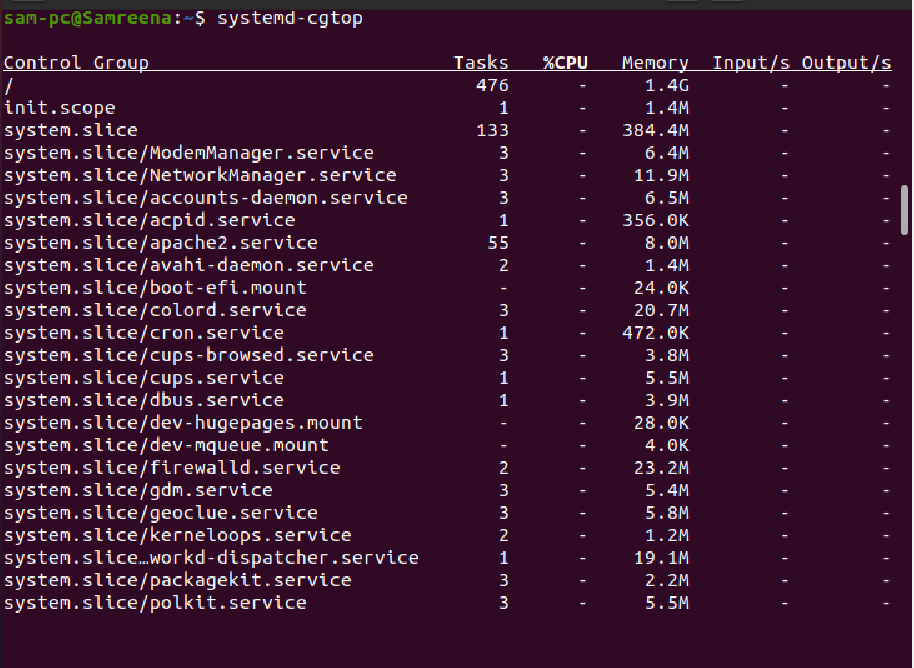
The previous Ubuntu distributions use the 'service' control to list all system services as follows:
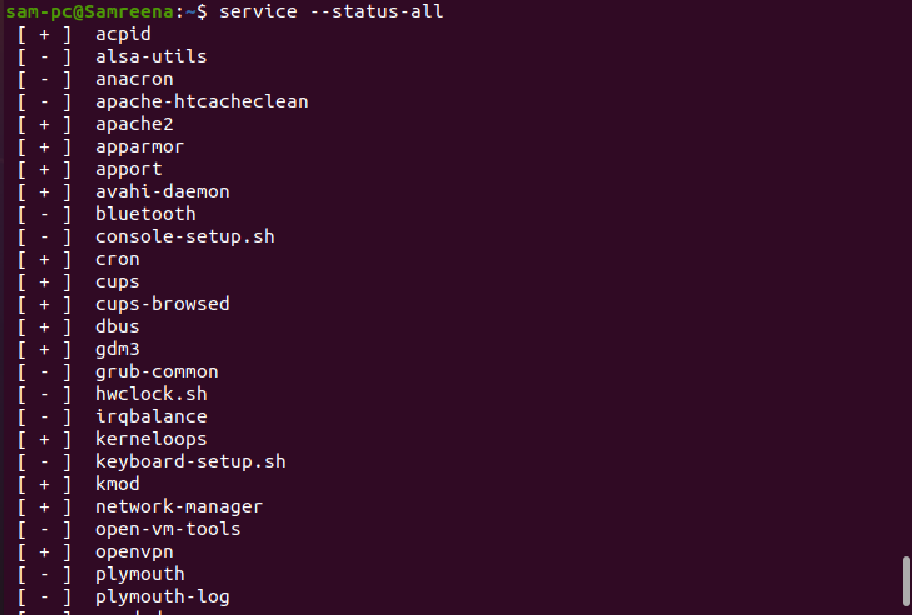
Y'all can also view all services by directly listing the /etc/init.d directory in older Ubuntu systems as follows:
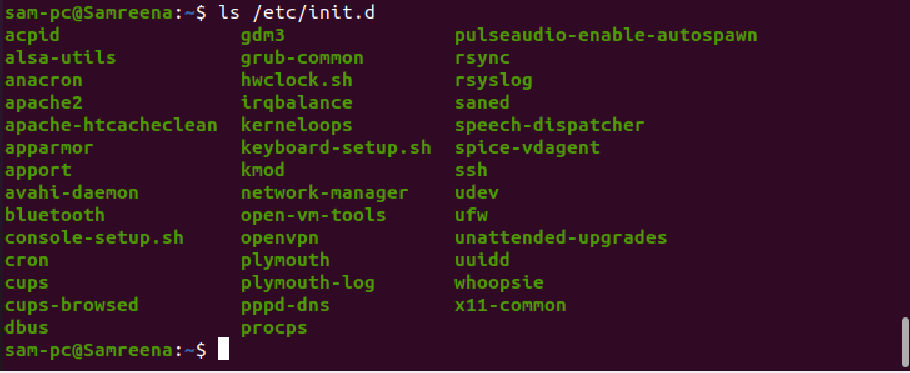
Conclusion
We learned how to list all services in Ubuntu twenty.04 organization using the systemctl command. We accept as well experienced various commands that are likewise helpful in listing all Ubuntu services. Well-nigh of the commands, like the service command, are obsolete at present. In the latest Ubuntu distribution, system administrators use 'systemctl' to get the details about all systemd services. The systemctl command also offers advanced features and is quite more useful as compared to the other service listing commands.
Which Files Contains All Services Started At Boot Ubuntu,
Source: https://linuxhint.com/see-all-services-ubuntu/
Posted by: cooperprotiong1973.blogspot.com


0 Response to "Which Files Contains All Services Started At Boot Ubuntu"
Post a Comment